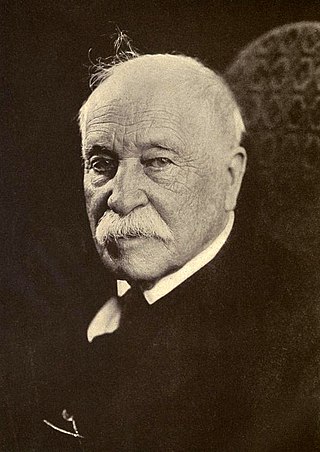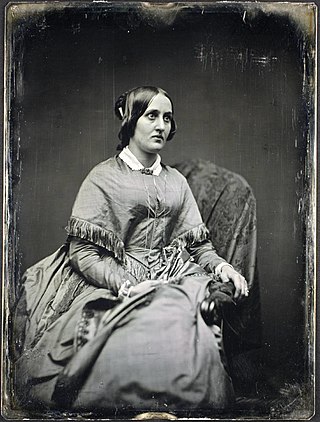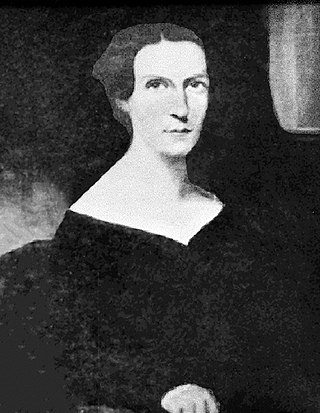Related Research Articles

Gladys May Aylward was a British-born evangelical Christian missionary to China, whose story was told in the book The Small Woman: The Heroic Story of Gladys Aylward, by Alan Burgess, published in 1957. The book served as the basis for the film The Inn of the Sixth Happiness, starring Ingrid Bergman, in 1958. The film was produced by Twentieth Century Fox, and filmed entirely in North Wales and England.

Mary Baker Eddy was an American religious leader, Christian healer, and author, who in 1879 founded The Church of Christ, Scientist, the Mother Church of the Christian Science movement. She also founded The Christian Science Monitor in 1908, and three religious magazines: the Christian Science Sentinel, The Christian Science Journal, and The Herald of Christian Science.

Harriet Elisabeth Beecher Stowe was an American author and abolitionist. She came from the religious Beecher family and wrote the popular novel Uncle Tom's Cabin (1852), which depicts the harsh conditions experienced by enslaved African Americans. The book reached an audience of millions as a novel and play, and became influential in the United States and in Great Britain, energizing anti-slavery forces in the American North, while provoking widespread anger in the South. Stowe wrote 30 books, including novels, three travel memoirs, and collections of articles and letters. She was influential both for her writings as well as for her public stances and debates on social issues of the day.

William Dean Howells was an American realist novelist, literary critic, and playwright, nicknamed "The Dean of American Letters". He was particularly known for his tenure as editor of The Atlantic Monthly, as well as for the novels The Rise of Silas Lapham and A Traveler from Altruria, and the Christmas story "Christmas Every Day," which was adapted into a 1996 film of the same name.

Harriet Jacobs was an African-American abolitionist and writer whose autobiography, Incidents in the Life of a Slave Girl, published in 1861 under the pseudonym Linda Brent, is now considered an "American classic".

Harriet Stratemeyer Adams was an American juvenile book packager, children's novelist, and publisher who was responsible for some 200 books over her literary career. She wrote the plot outlines for many books in the Nancy Drew series, using characters invented by her father, Edward Stratemeyer. Adams also oversaw other ghostwriters who wrote for these and many other series as a part of the Stratemeyer Syndicate, and oversaw the rewriting of many of the novels to update them starting in the late 1950s.

Margaret Oliphant Wilson Oliphant was a Scottish novelist and historical writer, who usually wrote as Mrs. Oliphant. Her fictional works cover "domestic realism, the historical novel and tales of the supernatural".

Benson John Lossing was an American historian, known best for his illustrated books on the American Revolution and American Civil War and features in Harper's Magazine. He was a charter trustee of Vassar College.

Incidents in the Life of a Slave Girl, written by herself is an autobiography by Harriet Jacobs, a mother and fugitive slave, published in 1861 by L. Maria Child, who edited the book for its author. Jacobs used the pseudonym Linda Brent. The book documents Jacob's life as a slave and how she gained freedom for herself and for her children. Jacobs contributed to the genre of slave narrative by using the techniques of sentimental novels "to address race and gender issues." She explores the struggles and sexual abuse that female slaves faced as well as their efforts to practice motherhood and protect their children when their children might be sold away.

Harriet E. Wilson was an African-American novelist. She was the first African American to publish a novel in North America.

Sara Jane Lippincott was an American writer, poet, correspondent, lecturer, and newspaper founder. One of the first women to gain access into the Congressional press galleries, she used her questions to advocate for social reform and women's rights.
Amy Catherine Walton, born Amy Catherine Deck and better known as Mrs O. F. Walton, was an English author of Christian children's books, mainly but not exclusively fictional. She was the daughter of an Anglican priest and married his curate, with whom she spent four years living in Jerusalem.

Harriet Elizabeth Prescott Spofford was an American writer of novels, poems and detective stories. One of the United States's most widely-published authors, her career spanned more than six decades and included many literary genres, such as short stories, poems, novels, literary criticism, biographies, and memoirs. She also wrote articles on household decorative art and travel as well as children's literature.

Harriet Mann Miller was an American author, naturalist, and ornithologist. She was one of the first three women raised to elective membership in the American Ornithologists' Union. Miller wrote stories for leading magazines. At the start of her career, her articles appeared under the pen name "Olive Thorne" while after marriage, she used the signature of "Olive Thorne Miller". Her books include: Little Folks in Feathers and Fur (1879), Queer Pets at Marcy’s (1880), Little People of Asia (1882), Birds’ Ways (1885), In Nesting Time (1888), and also a serial story entitled, "Nimpo’s Troubles", published in the St. Nicholas Magazine, in 1874.

Pamela; or, Virtue Rewarded is an epistolary novel first published in 1740 by the English writer Samuel Richardson. Considered one of the first true English novels, it serves as Richardson's version of conduct literature about marriage.

Harriet Ruggles Gold Boudinot (1805–1836) was notable as the wife of Cherokee Elias Boudinot, who became a leader in the Cherokee Nation and editor of its newspaper The Cherokee Phoenix. Harriett was the youngest of fourteen children of Colonel Benjamin and Eleanor Gold of Cornwall, Connecticut; they were a prominent Congregationalist family of English descent.

Harriet Bates was a 19th-century American author of poetry and novels. Her pen name, Eleanor Putnam, had been the maiden name of her great-grandmother.
Emily Clemens Pearson (1818–1900) was a 19th-century American writer of books primarily on the topic of slavery.

Lucie Armstrong, also known as Lucie Heaton Armstrong, was an English-Irish journalist and writer on etiquette.

Ida A. T. Arms was an American missionary-educator and temperance leader. She served as principal of Concepción College in Concepción, Chile and as president of the Woman's Christian Temperance Union (WCTU) in Chile. Arms translated a number of books from English to Spanish. Her biography was published posthumously.
References
- ↑ Suddoth, Harriet Almaria Baker Suddoth, 1883. The American Pictorial Home Book. A.L. Bancroft & Co. San Francisco, California.
- ↑ Silvervale, Lumina, 1873. An Orphan of the Old Dominion: Her Trials and Travels, Embracing a History of Her Life Taken Primarily from her Journals and Letters.
- ↑ Davis, Thadius M. 1993. "Women's Art and Authorship in the Southern Region: Connections" In The Female Tradition in Southern Literature. Edited by Carol S. Manning. University of Illinois Press.
- ↑ Sacramento Daily Union, October 13, 1889. Death of An Authoress" Mrs. Harriet Almira Baker Dies Friendless and Alone.